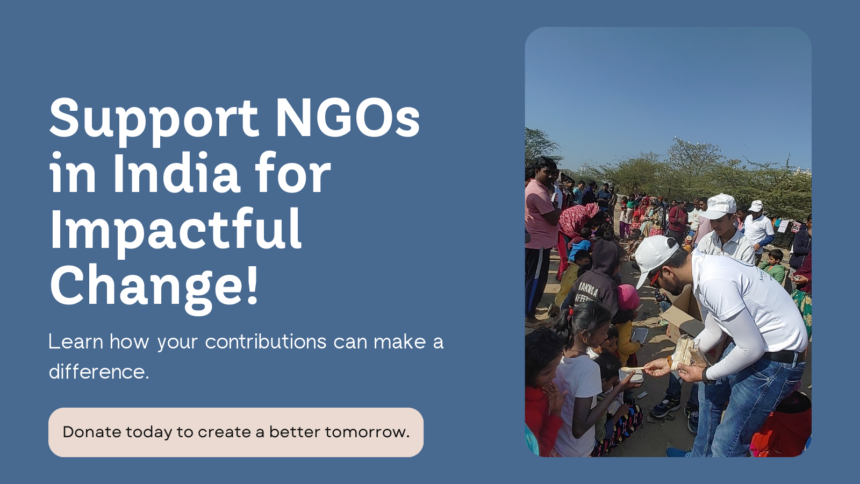The role of NGOs in India is crucial for bringing positive change and addressing social issues. A Non-Governmental Organization (NGO) is a bunch of people who want to do something for society, make a positive impact and help people in need. These NGOs work in different sectors like education, healthcare, the environment, poverty alleviation, women’s empowerment, and more. These groups often work at the grassroots level to bring positive change by engaging directly with communities.
Supporting an NGO in India is vital for several reasons, listed below:
- NGOs often work in areas where government initiatives may need to be improved, filling service gaps and addressing specific needs. The Role of NGOs in India brings specialized knowledge, expertise, and innovative approaches to tackling complex social challenges.
- An NGO is often more agile and responsive to the evolving needs of communities. They can adapt quickly, implement localized solutions, and engage with beneficiaries directly, thereby maximizing the impact of their interventions. The Role of NGOs in India is crucial in bringing about positive change and creating a more equitable and just society.
- Furthermore, supporting NGOs fosters citizen participation and promotes a sense of collective responsibility. It allows individuals, businesses, and organizations to contribute meaningfully towards causes they care about, enabling them to make a tangible difference in people’s lives.
By supporting NGOs, individuals, businesses, and organizations can actively participate in making a tangible impact, fostering citizen participation, and promoting collective responsibility. We can contribute to a more sustainable and inclusive future for all.
The following are a few ways that an NGO in India gets support:
- Financial support
Supporting an NGO in India financially can be done through donations and fundraising campaigns, corporate partnerships, and grant opportunities. Individuals can make one-time or recurring donations, participate in fundraising activities organized by an NGO in India, or contribute through corporate partnerships.
NGOs can also explore grant opportunities from government agencies and international organizations. Financial support enables NGOs to implement and expand their projects, addressing social challenges and driving positive change in education, healthcare, poverty alleviation, environmental conservation, and women’s empowerment. By actively supporting NGOs, individuals and organizations contribute to creating a more equitable and inclusive society in India.
Regardless of the approach, financial support can be a valuable way to impact the important work of an NGO in India positively.
- Volunteering
Apart from financial support, there are various ways to support an NGO in India through volunteer engagement. These include skill-based volunteering, employee volunteer programs, and virtual volunteering. Skill-based volunteering matches volunteers’ skills with the needs of the NGO, while employee volunteer programs allow employees to volunteer their time and skills to support NGOs. Virtual volunteering involves providing support remotely.
Each approach has benefits and considerations, so choosing the best option based on your skills, interests, and availability is important.
- Advocacy and awareness
Advocacy and awareness are important to creating impactful change and supporting NGOs in India. Social media campaigns can raise awareness about NGOs’ work by sharing stories, photos, and videos showcasing their impact. Hashtags can increase visibility and encourage others to share the campaign.
Partnering with influencers can help reach a wider audience and increase engagement. Influencers who align with the mission of the NGO can be identified and approached for a collaboration that benefits both parties.
Organizing events and workshops can create a platform for NGOs to share their work and connect with potential donors and volunteers. Events such as charity runs, benefit concerts, or auctions can be organized to raise funds and awareness. Workshops can be organized to educate people on the issues NGOs are addressing and how to get involved.
- Capacity building
Capacity building involves developing and strengthening individuals’ and organisations’ skills, knowledge, and resources to enable them to achieve their goals more effectively. Supporting an NGO in India, capacity building can help improve the quality and impact of their work. Training and development programs can be designed to provide NGOs with the skills and knowledge they need to carry out their work effectively, covering topics such as fundraising, project management, and advocacy.
By providing training and development programs, promoting knowledge sharing and collaboration, and providing technical support and resources. The role of NGOs in India can improve their capacity to achieve their goals and create impactful change in their communities. Overall, capacity building is an essential component of supporting an NGO in India.
- Policy and legislative advocacy
In supporting an NGO in India, policy and legislative advocacy can create an enabling environment for their work and improve the lives of the communities they serve. Research and advocacy aim to gather evidence and data to support policy and legislative advocacy efforts.
Engaging with government bodies involves building relationships with policymakers and other government officials to influence policy and legislative changes. Coalition building involves forming partnerships and alliances with other organizations and stakeholders to advocate for policy and legislative changes.
NGOs can influence policy and legislative changes that address the root causes of social issues and improve the lives of the communities they serve.
Conclusion
The possibility of supporting NGOs in various ways and creating impactful change exists. Training and development programs, knowledge sharing, collaboration, and technical assistance can all contribute to capacity building. Policy and legislative advocacy can be achieved through research and advocacy initiatives and engaging with government bodies.
NGOs, government bodies, and the communities that they serve must work together for impactful change to be achieved. Therefore, collective efforts are essential to achieving sustainable and meaningful change.
By working together and recognizing the importance of collective efforts, an NGO in India like Sankesh Global Foundation can create impactful change and improve the lives of the communities they serve.

